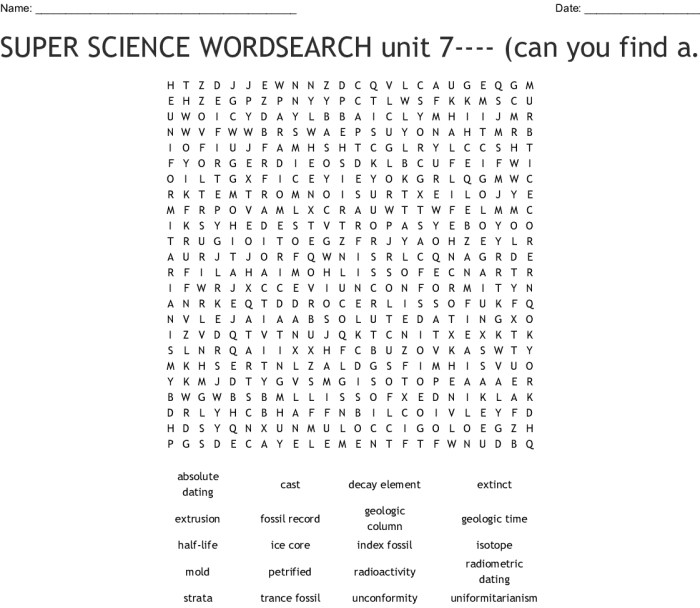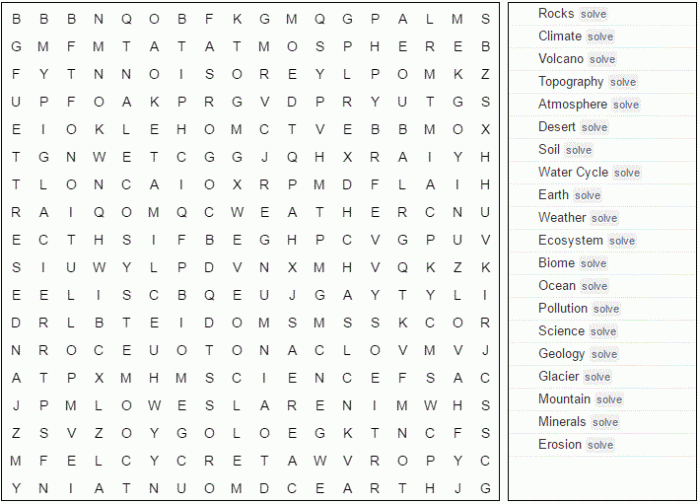Welcome to the realm of Earth science word search answers, where the quest for knowledge unfolds in an engaging and enlightening adventure. Dive into the depths of our planet’s mysteries as we decipher the hidden meanings behind each term, unlocking a treasure trove of scientific insights.
Through the lens of Earth science, we explore the fundamental principles that govern our planet’s intricate systems, from the vastness of the atmosphere to the depths of the oceans. With each discovery, we gain a deeper understanding of the Earth’s dynamic processes and the challenges it faces.
Earth Science Word Search Definitions
Acretion: The gradual accumulation of material to form a larger object, such as a planet or moon.
Atmosphere: The layer of gases that surrounds a planet or other celestial body.
Biosphere: The part of the Earth where life exists, including the atmosphere, hydrosphere, and lithosphere.
Climate: The long-term average of weather conditions in a particular area.
Crust: The outermost layer of the Earth, composed of solid rock.
Erosion: The process by which wind, water, or ice wears away the surface of the Earth.
Hydrosphere: The part of the Earth that is covered by water, including oceans, lakes, and rivers.
Lithosphere: The solid outer layer of the Earth, including the crust and upper mantle.
Mantle: The layer of the Earth below the crust, composed of solid rock.
Plate tectonics: The theory that the Earth’s crust is divided into plates that move over the mantle.
Weather: The short-term conditions of the atmosphere in a particular area.
Earth Science Concepts and Principles

Earth’s Structure
Earth is a layered planet, with a solid crust, a semi-solid mantle, and a solid inner core. The crust is the outermost layer, composed of solid rock. The mantle is the layer below the crust, and is made up of hot, semi-solid rock.
The inner core is the solid center of the Earth, and is made up of iron and nickel.
Plate Tectonics
Plate tectonics is the theory that the Earth’s crust is divided into plates that move over the mantle. These plates are constantly moving, and their movement can cause earthquakes, volcanoes, and other geological events.
Hydrology
Hydrology is the study of water on Earth. It includes the study of the distribution, movement, and quality of water on the planet. Hydrology is important for understanding the Earth’s climate, and for managing water resources.
Climate, Earth science word search answers
Climate is the long-term average of weather conditions in a particular area. Climate is determined by a number of factors, including latitude, altitude, and proximity to oceans. Climate change is a major environmental issue, and is caused by human activities that release greenhouse gases into the atmosphere.
Real-World Applications of Earth Science

- Earth science is used to find and extract natural resources, such as oil, gas, and minerals.
- Earth science is used to predict and mitigate natural disasters, such as earthquakes, floods, and hurricanes.
- Earth science is used to manage water resources, such as by building dams and reservoirs.
- Earth science is used to understand and mitigate the effects of climate change.
- Earth science is used to explore space and other planets.
Historical Development of Earth Science
Earth science has been studied for centuries, but the modern field of Earth science began to develop in the 18th century. In the 19th century, scientists began to develop the theory of plate tectonics, which revolutionized our understanding of the Earth’s structure and history.
In the 20th century, Earth science became increasingly important as humans began to realize the impact of their activities on the planet. Earth scientists began to study climate change, pollution, and other environmental issues.
Earth Science and Environmental Issues
Earth science is essential for understanding and addressing environmental issues. Earth scientists study the Earth’s climate, water resources, and other natural resources. They also study the effects of human activities on the environment.
Earth science can help us to reduce our impact on the environment and to protect the planet for future generations.
Earth Science Education and Outreach
Earth science education is important for everyone, regardless of their age or background. Earth science helps us to understand the world around us and to make informed decisions about our future.
There are many ways to learn about Earth science, including through schools, museums, and online resources. Earth science outreach programs can also help to engage the public in Earth science and to promote stewardship of the planet.
Earth Science Careers and Opportunities: Earth Science Word Search Answers

There are many different career paths available in Earth science. Earth scientists can work in academia, government, industry, and non-profit organizations.
Some common Earth science careers include:
- Geologist
- Hydrologist
- Meteorologist
- Oceanographer
- Environmental scientist
Earth scientists typically need a bachelor’s degree in Earth science or a related field. Some jobs may also require a master’s degree or a doctorate.
FAQ Compilation
What are the benefits of using Earth science word search puzzles?
Earth science word search puzzles provide an engaging and interactive way to learn about Earth science concepts, enhance vocabulary, and improve problem-solving skills.
How can I find Earth science word search puzzles?
Numerous websites and educational resources offer Earth science word search puzzles of varying difficulty levels, catering to both students and enthusiasts.
What are some real-world applications of Earth science?
Earth science plays a vital role in various fields, including weather forecasting, natural resource management, environmental protection, and urban planning.